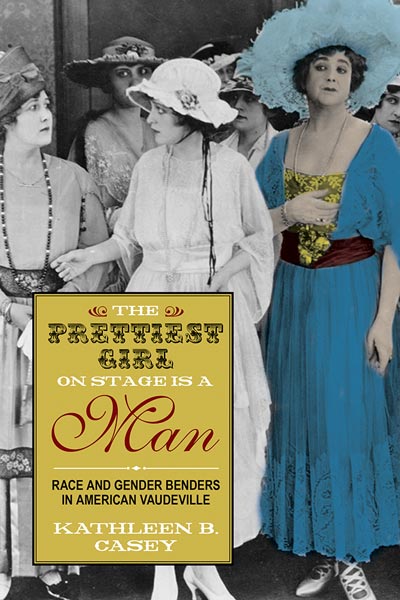 The Prettiest Girl on Stage Is a Man The Prettiest Girl on Stage Is a Man
Race and Gender Benders in American Vaudeville
Kathleen B. Casey
Narrated by Lee Ann Howlett
Available from Audible
Book published by University of Tennessee Press
From the 1890s through the 1920s, vaudeville reigned as one of the most popular entertainment forms in urban America. Through drama, humor, and satire, it invited its socially, economically, and ethnically diverse audiences to turn a self-conscious eye upon themselves and their culture, which was being rapidly transformed by such forces as immigration, racial discord, and new conceptions of gender roles. It was no coincidence that acts featuring cross-dressing performers and racial impersonators were among vaudeville’s biggest attractions.
In this lively and enlightening study, Kathleen B. Casey explores the ways in which the gender- and race-bending spectacles of vaudeville dramatized the economic, technological, social, and cultural upheaval that gripped the United States in the early twentieth century. She focuses on four key performers. Eva Tanguay, known as “The I Don’t Care Girl,” was loved for her defiance of Victorian decorum, linking white womanliness to animalistic savagery at a time when racial and gender ideologies were undergoing significant reconstruction. In contrast, Julian Eltinge, the era’s foremost female impersonator, used race to exaggerate notions of manliness and femininity in a way that reinforced traditional norms more than it undermined them. Lillyn Brown, a biracial woman who portrayed a cosmopolitan black male dandy while singing about an antebellum southern past, offered her audiences, black and white, starkly different visual and aural messages about race and gender. Finally, Sophie Tucker, who often performed in blackface during the early years of her long and heralded career, strategically played with prevailing ideologies by alternately portraying herself as white, Jewish, black, manly, and womanly, while managing, remarkably, to convince audiences that these identities could coexist within one body.
Analyzing a wide assortment of primary materials—advertisements, recordings, lyrics, sheet music, costumes, photographs, reviews, and press accounts from the era—Casey looks not only at gender and racial impersonation but also at how spectators reacted to these performances.
Kathleen B. Casey is an assistant professor of history at Virginia Wesleyan College.
REVIEWS:
“In this highly readable book, Kathleen Casey makes an important intervention into the study of early-twentieth-century American vaudeville and some of its most infamous stars. She pinpoints the blind spot in current scholarship by demonstrating how race as much as gender charges the meanings in vaudeville performance.”
—Linda Mizejewski, author of Pretty/Funny: Women Comedians and Body Politics and Ziegfeld Girl “Narrator Lee Ann Howlett brings to life an array of American vaudeville stars from the 1890s-1920s whose acts reflect the cultural changes caused by immigration, racial discord, and changing gender roles at that time. With a conversational delivery style, Howlett creates a tough persona for singer Eva Tanguay, emphasizing her strength while performing racy songs of the period. Also portrayed is Julian Eltinge, a top female impersonator whose extreme masculine facade in real life countered speculation that he was gay. Howlett is most enjoyable as Lillyn Brown, a biracial woman who played a black dandy with a top hat, which she removed to display long hair as she sang suggestive songs as a woman. The great Sophie Tucker herself played in blackface, impersonated men and people of other races, and emphasized her Jewishness. Listeners will be intrigued to hear that Lady Gaga is considered a modern gender bender.”
—AudioFile
|

